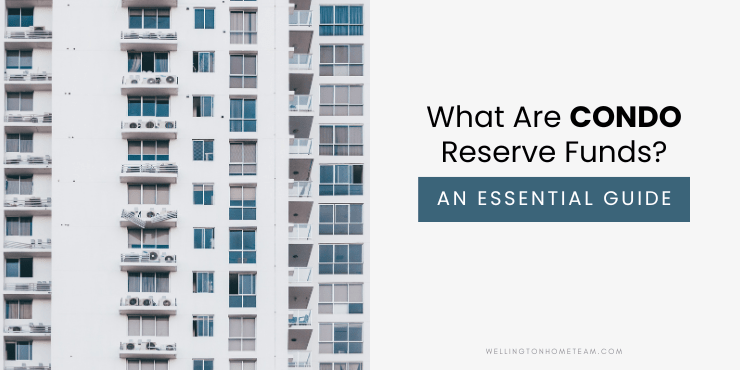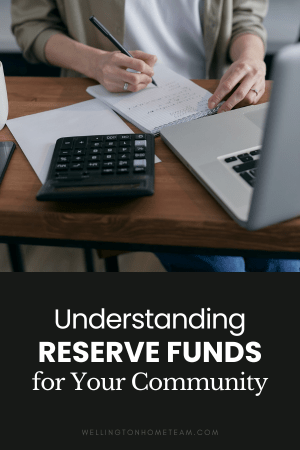What are Condo Reserve Funds? An Essential Guide
Condo reserve funds are crucial for HOA communities. These funds serve as savings for future repairs and replacements in common areas. Insufficient reserve funding can lead to financial difficulties and the need for special assessments or increased fees. These monies can also be called HOA reserve funds.

Conducting a reserve study by professionals helps evaluate the status of reserve funds. Establishing and maintaining a healthy reserve account is crucial to cover unexpected expenses. Collaboration with HOA board members and effective communication with homeowners is essential for proper reserve fund management. Challenges and legal considerations must also be taken into account.
Following best practices ensures sustainable condo reserve funds for the future of a community. From experience as a Wellington Realtor, checking on the financial health of a community is top of mind for many buyers.
What Are Condo Reserve Funds and Why Are They Important?
Condo reserve funds play a crucial role in HOA communities by providing financial stability and security for future repair and replacement needs. These funds are separate accounts dedicated to accumulating savings that can be used for major repairs, renovations, or unexpected expenses in common areas and shared amenities.
The Role of Reserve Funds in HOA Communities
Reserve funds act as a safety net to ensure HOA communities can address significant repairs and replacements without burdening homeowners with immediate, hefty special assessments. These funds are primarily designated for large-scale projects, such as roof replacements, elevator repairs, or pool renovations, which extend the lifespan and enhance the property’s value.
The Consequences of Insufficient Reserve Funding
Insufficient reserve funding can severely impact the HOA community and individual homeowners. With adequate reserves, the HOA may be able to address necessary repairs and replacements, leading to potential deterioration of the property’s condition and decreased overall value.
In such cases, homeowners may face sudden assessments, increased monthly HOA or condo fees, or deteriorating community amenities.
Conducting a Reserve Study for Your HOA
A reserve study is a crucial step in effectively managing HOA reserve funds. By conducting a reserve study, HOA boards can comprehensively understand their community’s financial needs and plan for future repairs and replacements. The purpose and benefits of a reserve study and the importance of hiring professionals for an accurate assessment are vital.
Understanding the Purpose and Benefits of a Reserve Study
A reserve study serves as a roadmap for financial planning within an HOA community. It evaluates the current condition of common elements, estimates their useful lifespan, and projects the associated costs of repairs and replacements over time.
 By clearly understanding the financial requirements, HOAs can make informed decisions regarding reserve contributions and ensure the long-term financial health of the community.
By clearly understanding the financial requirements, HOAs can make informed decisions regarding reserve contributions and ensure the long-term financial health of the community.
Some key benefits of conducting a reserve study include:
- Identifying potential funding gaps or deficiencies
- Establishing realistic funding goals and strategies
- Providing a basis for budgeting and financial forecasting
- Enhancing transparency and accountability to homeowners
These are just four benefits of conducting a study for reserves.
Hiring Professionals for an Accurate Reserve Study
While HOA board members may have a good understanding of their community’s needs, it is advisable to seek the expertise of professionals to perform a reserve study. These professionals, such as reserve study specialists or engineers, have the knowledge and experience to conduct a thorough assessment.
When hiring professionals for a reserve study, consider the following:
- Choose reputable and experienced professionals with a track record in reserve fund analysis
- Ensure the professionals understand the specific needs of your HOA community
- Obtain multiple quotes and compare services and pricing
- Review the professional’s methodology and deliverables to ensure a comprehensive study
By engaging professionals, HOA boards can have confidence in the accuracy and reliability of the reserve study findings. This professional assessment is a valuable tool for effective financial planning and decision-making.
Managing and Utilizing Condo Reserve Funds
Managing and effectively utilizing condo reserve funds is essential for the long-term financial stability of the community. Having and maintaining a healthy reserve account and using the condo reserve funds for necessary repairs and replacements should not be overlooked.
Establishing and Maintaining a Healthy Condo Reserve Account
A healthy reserve account requires careful planning and consistent contributions. Here are some key considerations:
- Regular Contributions: Allocate a portion of the HOA fees towards the reserve fund regularly. This ensures a steady stream of funding for future expenses.
- Professional Reserve Studies: Conduct periodic reserve studies by hiring professionals to assess the current and future funding needs. These studies provide insights into the required funding levels and help plan for upcoming expenses.
- Financial Planning: Develop a sound plan considering significant community assets’ estimated lifespan and replacement costs. This allows for accurate budgeting and forecasting of reserve fund requirements.
- Transparency and Accountability: Maintain clear communication with homeowners regarding the purpose and utilization of reserve funds. Share financial reports and updates regularly to ensure transparency and build trust.
Using Condo Reserve Funds for Repairs and Replacements
The reserve funds are crucial in financing repairs and replacements within the community. Consider the following when utilizing reserve funds:
- Prioritization of Needs: Identify and prioritize repair and replacement projects based on their urgency and impact on the community. Allocate funds accordingly to address critical issues first.
- Competitive Bidding: Obtain multiple quotes and proposals from qualified contractors for repair and replacement projects. This ensures fair pricing and quality workmanship.
- Proactive Maintenance: Implement preventive maintenance programs to extend the lifespan of community assets and minimize the need for costly repairs.
- Accurate Record-Keeping: Maintain detailed records of all reserve fund expenditures and ensure financial and accounting regulations compliance.
Financial Considerations for Condo HOA Reserve Funds
Determining the Ideal Amount for Reserve Funds
When it comes to HOA reserve funds, determining the ideal amount is crucial for long-term financial stability. While there is no one-size-fits-all answer, several factors should be considered.
- The size and complexity of the community: Larger communities with extensive shared amenities and common areas may require a larger reserve fund to cover potential repairs and replacements.
- The age and condition of the property: Older properties tend to require more frequent repairs and replacements, necessitating a sufficient reserve fund to address these ongoing needs.
- Anticipated future expenses: Planning for future costs, such as major renovations or equipment replacements, is essential in determining the appropriate reserve fund amount.
- Expert recommendations: Consulting with professionals experienced in reserve fund management can provide valuable insights and guidance on determining the ideal reserve fund amount based on the community’s unique characteristics.
Long-Term Planning and Budgeting for Reserves
Proper long-term planning and budgeting are essential to ensure the viability of condo reserve funds. It involves understanding the community’s ongoing and anticipated financial needs and developing a comprehensive strategy.
Some critical considerations for effective long-term planning and budgeting include:
- Regular reserve fund evaluations: Conduct periodic reserve studies or assessments to assess the current state of the reserve fund and identify any funding gaps or surpluses.
- Factoring in inflation and cost increases: Accounting for inflation and rising prices is crucial to account for the future purchasing power of the reserve funds.
- Establishing funding goals: Setting realistic funding goals ensures a steady accumulation of reserves over time, allowing the community to address future maintenance and repair needs adequately.
- Adjusting budgets as needed: Flexibility is essential in budgeting for reserves. Adjust the budget to maintain financial stability when unexpected expenses arise or funding needs change.
By appropriately determining the ideal reserve fund amount and implementing a well-thought-out long-term planning and budgeting strategy, HOAs can ensure financial security and effectively address the community’s future needs.
Learn why condo reserve funds are essential for HOA communities and how they provide financial security for future repairs and replacements. #realestate #condoreservefundsCollaboration and Communication with the HOA Board and Members
Effective collaboration and communication between the HOA board and members are crucial in managing condo reserve funds. By involving board members in reserve fund management, you can leverage their expertise and diverse perspectives to make informed financial decisions. This collaboration ensures transparency and shared responsibility for the reserve funds’ health.
Involving Board Members in Reserve Fund Management
Encouraging board members’ active involvement in reserve fund management fosters a sense of ownership and accountability. Regular meetings should be held to discuss the reserve fund’s financial status, upcoming projects, and potential funding needs.
You can benefit from their collective insights and expertise by including board members in decision-making, enabling better fund allocation and planning.
Educating and Informing Homeowners about Reserve Funds
Open and transparent communication with homeowners is essential to build trust and ensure their understanding of the purpose and importance of reserve funds. Regularly inform homeowners about the current status of the reserve fund, ongoing or upcoming repair projects, and the significance of maintaining adequate funding.
Providing educational materials, organizing informational sessions, and utilizing digital communication channels are effective ways to keep homeowners well-informed.
Moreover, homeowners should be encouraged to actively participate in association (HOA) meetings and discussions related to reserve funds. Their input, ideas, and concerns can contribute to informed decision-making and help prioritize funding for projects that align with their expectations and the community’s needs.
By fostering collaboration and maintaining clear lines of communication, HOA boards and homeowners can work together towards the shared goal of effectively managing and utilizing condo reserve funds for the community’s long-term well-being.
Challenges and Solutions in HOA Reserve Fund Management
Dealing with Unexpected Expenses and Emergency Repairs
Managing HOA reserve funds can be challenging when unexpected expenses and emergency repairs arise. These situations can put a strain on the reserve account and require careful consideration and planning:
 Regular Assessment Adjustments: When unexpected expenses occur, it might be necessary to adjust the regular assessments temporarily to ensure adequate funds are available for immediate repairs or replacements.
Regular Assessment Adjustments: When unexpected expenses occur, it might be necessary to adjust the regular assessments temporarily to ensure adequate funds are available for immediate repairs or replacements.- Prioritizing Repairs: Assessing the urgency and importance of repairs is crucial. Prioritizing emergency repairs helps allocate funds effectively and ensures the community’s safety and well-being.
- Building Emergency Reserve Cushion: Maintaining a portion of reserve funds as an emergency cushion is advisable to address unforeseen expenses promptly without affecting the regular operating budget.
Addressing Special Assessments and Funding Shortfalls
In certain circumstances, addressing special assessments and funding shortfalls becomes necessary to maintain the financial stability of the HOA’s reserve funds:
- Educating Homeowners: Clear and transparent communication is vital when introducing special assessments. Providing homeowners with comprehensive information about the evaluation’s need, scope, and timeline helps foster understanding and support.
- Strategic Budget Planning: Proactive budget planning is crucial in minimizing the need for special assessments. HOAs can avoid funding shortfalls and unforeseen financial strains by estimating future expenses and saving accordingly.
- Exploring Financing Options: In some cases, HOAs may consider exploring financing options such as loans or lines of credit to cover immediate funding shortfalls. However, careful consideration of repayment terms and interest rates should be made.
By proactively addressing unexpected expenses, emergency repairs, and funding shortfalls, HOAs can effectively manage their reserve funds and ensure the long-term financial health of the community.
Legal and Regulatory Framework for HOA Reserve Funds
Understanding Laws and Regulations Related to Reserve Funds
HOA reserve funds are subject to various laws and regulations that govern their establishment, management, and use. HOAs must understand these legal requirements to ensure compliance and protect the interests of homeowners.
Some common legal considerations for HOA reserve funds include:
- State Laws: Each state may have specific legislation governing reserve funds for HOAs. These laws outline the minimum funding requirements, permissible uses of reserve funds, and other vital provisions.
- HOA Governing Documents: The HOA’s governing documents, such as the Declaration of Covenants, Conditions, and Restrictions (CC&R), may contain specific provisions related to reserve funds. HOAs must adhere to these guidelines when managing and utilizing reserve funds.
- Fiduciary Duty: HOA board members have a fiduciary duty to act in the association’s and its members’ best interests. This includes responsibly managing reserve funds and ensuring their proper use.
- Financial Disclosures: HOAs are often required to provide financial disclosures to homeowners, including details about reserve funds. These disclosures inform homeowners about the status of the reserves and any planned or ongoing projects that may impact the funds.
Compliance and Reporting Requirements for Reserve Funds
HOAs must fulfill specific compliance and reporting requirements concerning reserve funds. These obligations help maintain transparency and accountability in the management of these funds.
Some substantial compliance and reporting considerations for HOA reserve funds include:
- Financial Statements: HOAs must maintain accurate and up-to-date financial statements that reflect the status of their reserve funds. These statements should include information about the current balance, contributions made, and any expenditures from the reserves.
- Reserve Fund Disclosures: HOAs must often disclose information about their reserve funds in regular financial reports or annual meetings. This helps homeowners stay informed about the association’s financial health and the status of the reserve funds.
- Audits and Reviews: In some cases, HOAs may be required to undergo audits or reviews of their financial records, including the reserve funds. These examinations ensure compliance with financial regulations and provide an independent assessment of the association’s financial stability.
- Legal Compliance: HOAs must comply with all applicable laws and regulations related to reserve funds and financial management. Failure to meet these requirements may result in legal consequences or penalties.
Understanding and adhering to the legal and regulatory framework for HOA reserve funds is crucial for maintaining transparency, accountability, and compliance within the association.
Best Practices and Tips for Effective Condo Reserve Fund Management
Managing HOA reserve funds effectively is crucial for the long-term financial stability of the community. By following best practices and implementing intelligent strategies, HOAs can ensure their reserve funds are sufficient and well-maintained. Here are some tips to consider:
Working with Professional HOA Management Companies
Collaborating with experienced HOA management companies can significantly assist in reserve fund management. These professionals have the expertise and knowledge to guide budgeting, reserve studies, and financial planning. They can help HOAs accurately assess their reserve needs, establish realistic funding goals, and ensure compliance with relevant regulations.
Please consider spreading the word and sharing; What are Condo Reserve Funds? An Essential Guide
Learn why condo reserve funds are essential for HOA communities and how they provide financial security for future repairs and replacements. #realestate #condoreservefundsAbout the Author
Top Wellington Realtor, Michelle Gibson, wrote: “What are Condo Reserve Funds? An Essential Guide ”
Michelle has been specializing in residential real estate since 2001 throughout Wellington Florida and the surrounding area. Whether you’re looking to buy a condo, sell an equestrian estate, or rent a single-family home she will guide you through the entire real estate transaction. If you’re ready to put Michelle’s knowledge and expertise to work for you call or e-mail her today.
Areas of service include Wellington, Lake Worth, Royal Palm Beach, Boynton Beach, West Palm Beach, Loxahatchee, Greenacres, and more.

 Michelle Gibson of the Hansen Real Estate Group Inc is a full-time REALTOR who has been specializing in Wellington, Florida real estate since 2001. This veteran of the real estate industry has expertise in technology, marketing, and social media.
Michelle Gibson of the Hansen Real Estate Group Inc is a full-time REALTOR who has been specializing in Wellington, Florida real estate since 2001. This veteran of the real estate industry has expertise in technology, marketing, and social media.